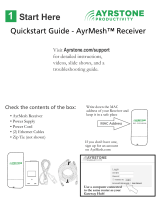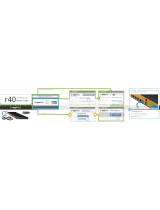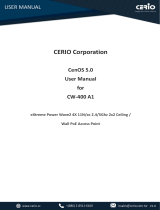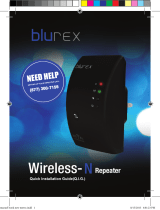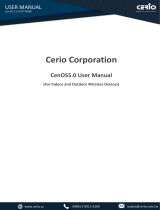
© Copyright 2017 TRENDnet. All Rights Reserved.
Contents
Product Overview ........................................................................... 1
Package Contents .......................................................................................................... 1
Features ......................................................................................................................... 1
Product Hardware Features........................................................................................... 2
Product Application ....................................................................................................... 3
Basic Installation & Setup ................................................................ 4
Access Point Compatibility ............................................................................................ 4
A. Initial Controller Setup .............................................................................................. 4
B. Connect your wireless access points ......................................................................... 6
C. Initial Wireless Setup ................................................................................................. 7
Mounting Installation ...................................................................... 9
Desktop Hardware Installation ............................................................................ 9
Rack Mount Hardware Installation ...................................................................... 9
Controller Management ................................................................ 10
Access your wireless controller management page .................................................... 10
Change your controller administrative login password ............................................... 10
Change your controller LAN IP address ....................................................................... 11
Upgrade your controller firmware .............................................................................. 12
View your controller system log .................................................................................. 14
Backup and restore your controller configuration settings ......................................... 14
Reboot your controller ................................................................................................ 16
Set idle timeout for users logged into controller management .................................. 16
Reset your controller to factory defaults .................................................................... 17
Controller default settings ........................................................................................... 17
Create additional users to access controller management ......................................... 18
Set your controller date and time settings .................................................................. 18
Power over Ethernet (PoE) Settings ............................................................................ 19
Power over Ethernet (PoE) Scheduling ........................................................................ 20
Access point management and configuration ................................ 21
Access Point Compatibility .......................................................................................... 21
Manage and configure access points .......................................................................... 21
Discover and add access points ......................................................................... 21
Configuring controller managed access points.................................................. 22
Manually add an access point ........................................................................... 26
Remove access points from the controller ........................................................ 26
Simultaneously upgrade firmware for multiple access points .......................... 27
Upgrade access point firmware using the online upgrade ................................ 27
Moving APs to a new controller ........................................................................ 29
Wireless groups and profiles ....................................................................................... 30
Creating a wireless profile ................................................................................. 30
Creating a new wireless group .......................................................................... 33
Assigning access points to a wireless group ...................................................... 33
Captive Portal .............................................................................................................. 35
A. To Internal Portal URL ................................................................................... 35
B. To Advertisement URL ................................................................................... 38
C. Captive Portal with RADIUS (CoovaChilli) ...................................................... 39
WAP Maps™ ................................................................................................................ 40
Upload floor plans ............................................................................................. 40
Monitoring access points and clients .......................................................................... 42
Viewing the controller dashboard ..................................................................... 42
View client connections ..................................................................................... 43
Technical Specifications ................................................................ 44
Troubleshooting ........................................................................... 46
Appendix ...................................................................................... 49




















